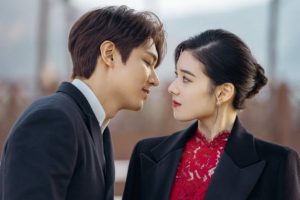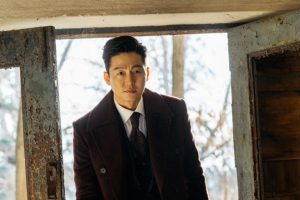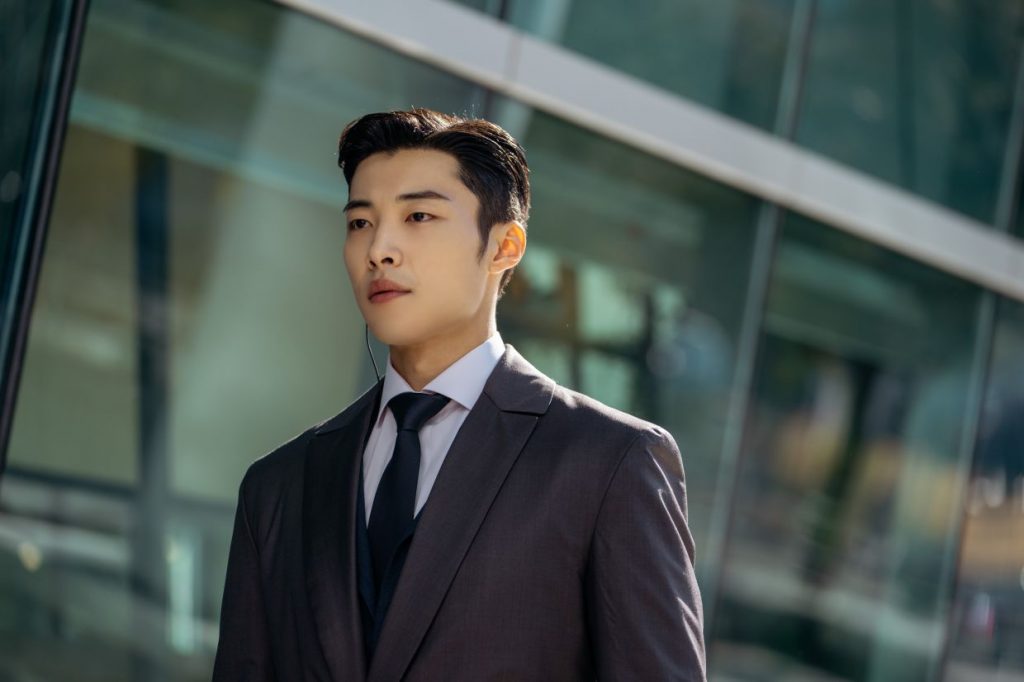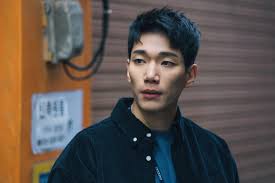By all rights, The King: Eternal Monarch should have everything going for it. It’s been penned by star writer Kim Eun-sook whose previous credits include classics such as Mr. Sunshine, Goblin, Descendants of the Sun, Secret Garden and The Heirs. The plot sounds intriguing: The King of the Kingdom of Corea finds a portal to another world, one which contains the Republic of Korea as we know it. The same people exist on both sides of the door, with a different name and different lives. Beyond the gate lies not only his one true love, but also the truth about the assassination of his father, the previous King, and his own survival that fateful night, twenty-five years ago. At the drama’s helm is Director Baek Sang-joon, who helped bring alive the cinematic Descendants of the Sun.
The cast includes popular young actors such as Woo Do-hwan (My Country) and Kim Go-eun (Goblin), and most notably, as its first lead — Hallyu King Lee Min-ho (Legend of the Blue Sea). The King marks Lee’s return to dramaland after completing his military service. In keeping with the plot, much of the cast play double roles that test their acting chops.
On the surface, The King has all the ingredients for a mega hit, but bring them all together, and the sum is less than it’s parts. The show — being aired simultaneously on Netflix and SBS TV — opened to its highest ratings, 12.9%, which have since then been rather volatile. Episode 8 saw its worst ratings, a mere 6.8%. What has gone wrong?
One of the primary requirements of any well-written fantasy is not only the careful building of a new world, but also its ability to convince the audience to suspend disbelief and believe in that world. From epic classics such as The Lord of the Rings to modern day fan favorite The Untamed, viewers understand that they are watching an unreal world and put aside real-world logic to immerse themselves in the story and quests of the characters.
This has proved difficult with The King for two reasons. First, information is doled out in bits and pieces, and the crumbs are not enough for us to fully grasp the stakes involved. Important elements that could be used to create a sense of danger and urgency are ignored: the rules of the travel between the world are barely touched upon. What are the consequences? Will the portal be open forever? There’s no “fear” of the star-crossed lovers separating and/or being forced to choose between a lover and their loved ones. Only in week 4 is it finally hinted that only one of the two personas of each character can survive, raising worries about many of our favorite dual role characters.
While the finer details of the mechanics of parallel world travel are brushed aside, evil Prince Yi Rim (Lee Jung-jin) is used extensively to create tension. However, even now, half way through the show, we don’t know what Yi Rim’s plan is, when he will strike, or why we should even particularly care, beyond the obvious threat to Yi Gon. All we know is that Yi Rim has been moving freely between the two worlds and doing something in preparation for a second attempt at nabbing the magical flute. While he goes about being evil and mysterious, our (mostly) oblivious protagonists have been cheerfully running amok between the worlds and falling in love.

Second, the show doesn’t conform to its own logic. Creative liberty is obviously an essential element of fiction, but for a tightly-written plot, the elements of the story must conform to the logic of the world being portrayed. Not real-world logic, but the logic of that fictional world. Without it, inconsistencies start to stand out and interfere with one’s enjoyment of the show.
For instance, we are told that Jung Tae-eul is a badass, no-nonsense, competent cop. So badass, no-nonsense, and competent, in fact, that she houses the horse of a suspicious man without an identity, allows him to befriend her father, accompanies him to the jewelers’ to sell rare diamonds of unknown origin, and finally, also accompanies him alone to a forest at night without telling anyone where she’s going.
Yi Gon is similarly frustrating. As a math wiz and seemingly intelligent man, it can be (with some difficulty) believed that he was able to easily accept the existence of a parallel world (Korea), without panicking at all. The audience buys it because Lee Min-ho carries Yi Gon with a gravitas that suggests he’s just that cool. However, it is hard to understand why he would go around telling everyone in Korea that he is a King from a parallel world (Corea) and that his word is enough to prove his identity, and expect them to believe it too.

Most disappointing of all the characters is Prime Minister Goo Seo-ryung (Jung Eun-chae). Unsatisfied with being the Prime Minister of the Kingdom of Corea, capable of quick, decisive action in times of war, she’s a gold digger vying for the romantic affectations of our King. What a shame. Kim Eun-sook is famous for mistreating her female characters, but I’d hoped better after Mr. Sunshine.
In the end, because of the lack of clarity as to what’s going on, and the poor, illogical construction of the characters, we are left with a pretty show that unfortunately lacks substance. The two main plot threads fall flat. Yi Rim’s nefarious plans lack oomph, and there’s no build-up to the love line between Yi Gon and Jung Tae-eul, which now seems forced.
The dead fish kiss scene in Episode 5 perfectly represents Yi Gon and Tae-eul’s inexplicable romance. Dare I say it, Yi Gon’s feelings make even less sense than Tae-eul’s. Until Tae-eul witnessed first-hand the prestige and wealth at Yi Gon’s feet, she’d merely been tolerating him and his romantic overtures — but a few hours in his world changed everything. That’s understandable: Yi Gon is handsome, wealthy and incredibly charming; and all of that is being thrown at her at full force. Yi Gon, on the other hand, appears to have been in love with the woman in the ID card since that fateful day he almost died as a child. It is difficult to understand why love, and not gratitude, is the feeling he associates with his (supposed) savior, but we have no choice but to accept it.
What works for the show thankfully, is the cast. Yi Gon is a character that Lee Min-ho does well. We’ve seen him before as the entitled, intelligent, rich boy who falls in love — these are the roles that shot him to Hallyu stardom. Delivering cringe-worthy lines with grace, he paints a believable and charming Yi Gon. Kim Go-eun is similarly pleasing to watch, both as Tae-eul and her alter ego, Luna, whom we finally meet in the fourth week. Both characters are rough, but Luna has a different, almost unhinged, look in her eyes. Minus their actions that rarely make sense, the two leads wear the characters well.
Even more of a delight to watch is Woo Do-hwan in a dual role as Jo Yeong/Jo Eun-sup. Woo Do-hwan proves his acting prowess every time Jo Yeong and Jo Eun-sup come face to face. Their resemblance is uncanny, but it is clear these are two different people. Even so, I wouldn’t call this his very best work (see My Country). Given a better script, Woo Do-hwan could have done much more with this dual role. Too bad we won’t get to see it.
The real scene stealer is proving to be the dark horse: Kim Kyung-nam as Detective Kang Shin-jae. To begin with, Shin-jae has the richest backstory of all the characters. From the very start, we’re introduced to a hardworking, honest detective whose own mother is addicted to gambling. We see his internal struggle and eventual decision to turn in her in for her illegal activities. We also know that his one-sided love for Tae-eul is doomed. What a tragic guy — and it only gets worse, as the show goes on.
Yet, Shin-jae is far from pitiful. Kim Kyung-nam plays him with depth and nuance, and one can’t help but feel for the character while also trusting his innate resilience. This is my first time watching Kim, and I hope this role will be a turning point for the actor. Clearly, he has much to bring to the table.
The show utilizes its beautiful young cast to maximum effect. The lighting, camerawork and make-up are perfectly designed to bring out these beautiful actors at their most gorgeous. There are many gratuitous shots of Lee Min-ho in various outfits (of his muscular arms as a rower, in traditional attire as King, in suits, riding a white horse and more). We see Woo Do-hwan in two different, handsome personas. Kim Kyung-nam broods handsomely. Kim Go-eun is possibly the most fair, beautiful, unfashionable detective tying her hair menacingly. Jung Eun-chae is proudly the most fashionable Prime Minister she can be, modelling expensive clothing and high heels at every occasion.
In conclusion, The King has great potential. The show’s lighting, its sets, the casts’ names, their outfits and the sheer scale of things — parallel worlds — promises an epic along the lines of Goblin. But halfway through its run, The King has yet to deliver. Thus, watch this one for the pretty, not for the plot, and you will not be disappointed.
(Nielson Korea, YouTube; Images via SBS)






